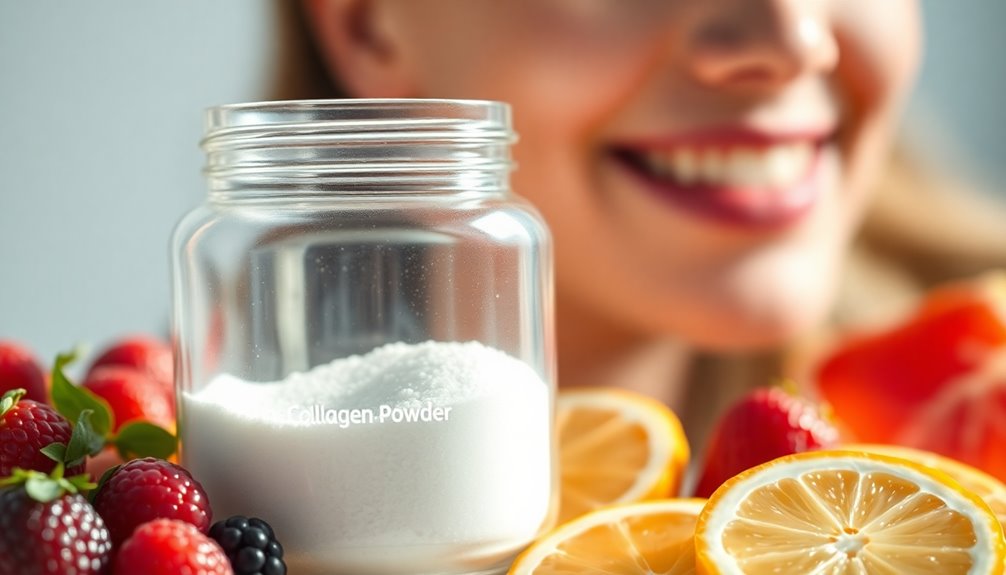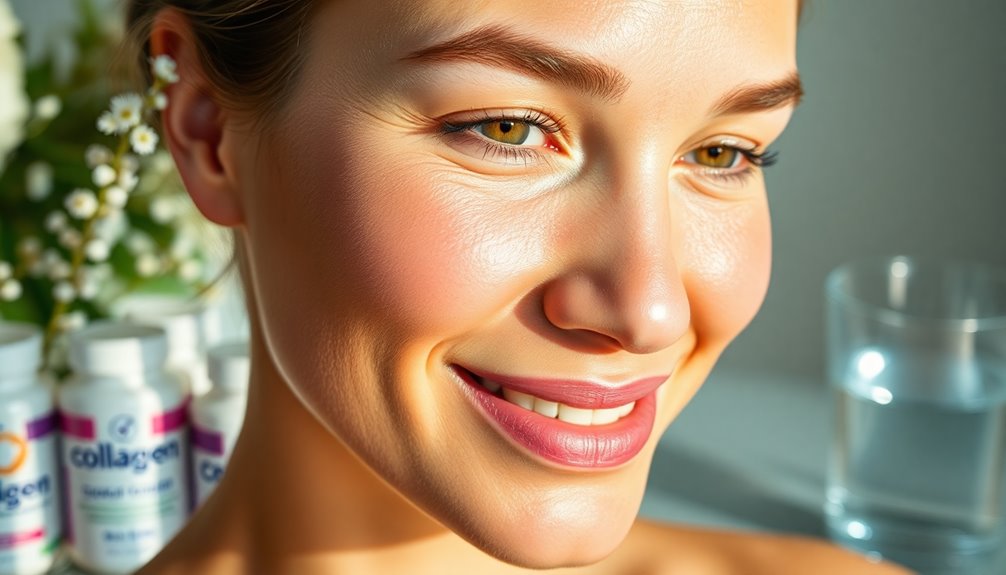Collagen supplements can indeed improve your skin's elasticity and moisture levels. Research shows that oral collagen can enhance skin firmness, making it look more youthful. While topical products may not absorb well, supplements offer a more effective option for boosting collagen. However, individual results may vary, and it's crucial to combine them with a balanced diet and healthy lifestyle for the best outcomes. Curious about more ways to support your skin's health?
Key Takeaways
- Collagen supplements may enhance skin elasticity and moisture, as shown in studies indicating improved skin firmness and hydration levels.
- Oral collagen supplementation has demonstrated positive effects on skin appearance, while topical collagen products have limited absorption.
- A balanced diet with protein and vitamin C is essential for collagen synthesis, complementing the effects of supplements.
- Individual responses to collagen supplements can vary; they should support, not replace, a healthy diet.
- Lifestyle factors like hydration, sun protection, and avoiding smoking also significantly influence collagen production and overall skin health.
What Is Collagen and Its Role in the Body?

Collagen serves as an essential building block in your body, making up about 30% of your total protein. It's important for maintaining skin elasticity and the integrity of your connective tissue.
Your body naturally produces collagen using amino acids from protein-rich foods like meat, fish, and dairy, along with nutrients like vitamin C, zinc, and copper. Additionally, folate has been shown to play a role in supporting collagen production and overall skin health. However, as you age, collagen production declines, especially for women post-menopause, leading to sagging skin and wrinkles.
There are at least 29 types of collagen, with types I, II, and III being the most common in your body. To support skin health, incorporating collagen-rich foods into your diet is crucial, ensuring your skin remains hydrated and resilient. Additionally, a flexitarian diet that emphasizes plant-based foods can provide essential nutrients that support collagen synthesis.
How Does Your Body Build Collagen?

Your body builds collagen using amino acids from the proteins you eat, like meat, fish, and legumes. Vitamin C plays an essential role in this process by helping transform specific amino acids into collagen. Additionally, certain essential oils, such as lemon oil, can support overall skin health and may enhance the body's natural collagen production. Moreover, consuming foods rich in antioxidants can further support collagen synthesis and protect skin health.
Amino Acids and Sources
While the body has an impressive ability to produce collagen, it relies heavily on specific amino acids derived from your diet. The most abundant amino acids in collagen are glycine, proline, and hydroxyproline, which are crucial for its structure and function.
To support collagen production, you need to consume protein-rich foods like meat, fish, eggs, and dairy, as well as plant-based sources such as legumes and quinoa. Adding collagen supplements can also help boost your intake of collagen peptides. Additionally, incorporating hydrocolloid technology in your skincare routine can enhance the overall health and appearance of your skin. Regular intake of essential oils can also contribute to skin health by promoting relaxation and reducing stress, which may indirectly support collagen production.
Don't forget that vitamin C plays an essential role in stabilizing collagen structure. For ideal skin moisture and collagen maintenance, aim for a balanced diet with adequate protein and essential nutrients like zinc and copper.
Role of Vitamin C
To build collagen effectively, the body needs more than just amino acids; vitamin C plays a pivotal role in this process. It helps stabilize collagen by hydroxylating proline and lysine amino acids, essential steps in collagen synthesis. Without adequate vitamin C, even with sufficient amino acids, your body can't produce collagen effectively, leading to weakened connective tissues. Incorporating foods high in vitamin C, like citrus fruits, strawberries, and bell peppers, is vital for maintaining skin elasticity and overall skin health. Additionally, consuming adaptogenic properties can help reduce stress, which may further support skin health by minimizing cortisol-related damage. A well-balanced diet, including essential fatty acids, is also important for overall skin health. This vitamin not only supports collagen production but also helps improve skin appearance. If you're considering collagen supplementation or using collagen products, remember that pairing them with adequate vitamin C will enhance their effectiveness in promoting healthy, youthful skin.
The Science Behind Collagen Supplements

As research into collagen supplements unfolds, many are keen to understand their potential benefits for skin health. Taking collagen, particularly in the form of collagen powder or collagen peptides, may enhance skin elasticity and moisture levels. A review of 19 studies involving 1,125 participants indicated promising results, yet most studies included additional ingredients like vitamins. Incorporating nutrient-dense foods such as chia seeds into one's diet may also contribute positively to skin health.
| Study Type | Findings on Skin Health |
|---|---|
| Randomized Controlled Trials | Enhanced skin elasticity |
| Small Study | Improvements in skin firmness |
| Oral Supplementation | Increased skin moisture levels |
| Topical Products | Limited absorption, ineffective |
While benefits of collagen are noted, further large-scale studies are necessary to confirm the long-term effects on skin health and clarify if collagen really works. Additionally, a diet rich in whole, unprocessed foods is associated with improved skin health and overall wellness.
Do Collagen Supplements Deliver Real Benefits for Skin?

Many people wonder if collagen supplements truly deliver on their promises for skin health. Research shows that these supplements can improve skin moisture, elasticity, and even reduce wrinkles, which supports their potential benefits.
Collagen supplements may enhance skin moisture and elasticity while reducing wrinkles, supporting their potential benefits for skin health.
In a review of 19 studies, participants reported enhanced skin firmness and suppleness. However, it's important to note that improvements might also arise from additional ingredients in those trials.
While collagen supplements can promote collagen formation, they need to be broken down into peptides for absorption. This process doesn't specifically target skin health alone.
For best results, consider combining collagen supplements with effective topical treatments like retinoids and antioxidants, which are proven to improve skin texture and minimize wrinkles more effectively.
Lifestyle Factors That Affect Collagen Production

Collagen production is influenced by various lifestyle factors, and understanding these can help you maintain healthier skin. Here are three key elements to contemplate:
1. Nutrition: Incorporate protein-rich foods and vitamin C into your diet. This helps your body synthesize collagen effectively.
Contemplate adding collagen drinks for an extra boost.
2. Sun Protection: Always wear sunscreen to shield your skin from excessive sun exposure. This prevents collagen breakdown and keeps your skin elastic.
3. Avoid Harmful Habits: Make sure to avoid smoking, as it damages collagen and reduces blood flow, accelerating signs of aging.
Additionally, limit alcohol intake to preserve your skin's health.
Protecting Your Natural Collagen for Healthy Skin

Taking care of your skin involves more than just boosting collagen production; it's also about protecting what you already have.
Daily sunscreen is essential in safeguarding your natural collagen from UV damage, which fuels skin aging. Incorporate antioxidant-rich foods like fruits and vegetables into your balanced diet to combat oxidative stress that harms collagen.
Daily sunscreen protects collagen from UV damage, while antioxidant-rich foods help combat oxidative stress for healthier skin.
Avoid smoking, as it narrows blood vessels and accelerates aging. Stay hydrated; consistent hydration supports skin health and maintains collagen levels, preventing dehydration's negative effects on elasticity.
Additionally, consider collagen drinks or bone broth, which can be beneficial, but remember that a diet rich in protein, vitamin C, zinc, and copper is foundational for supporting your body's natural collagen production.
Frequently Asked Questions
Does Taking Collagen Actually Help Your Skin?
Taking collagen may help your skin in several ways. Studies suggest it can improve moisture, elasticity, and reduce wrinkles, giving you a more youthful appearance.
The collagen you consume gets broken down into peptides, which your body uses to support collagen formation. However, results can vary, and additional ingredients might play a role too.
It's a good idea to consult a healthcare professional before starting any supplement to align it with your health needs.
How Long Does It Take for Collagen Supplements to Improve Skin?
Imagine planting a seed in your garden. You water it daily, nurturing it with care, yet it takes time to bloom.
Similarly, when you start taking collagen supplements, expect changes in your skin within 4 to 12 weeks. Many notice subtle improvements after a month, while more significant results, like increased firmness and reduced wrinkles, typically appear around the 12-week mark.
Consistency, hydration, and a balanced diet can help this transformation flourish even more.
What Does the Mayo Clinic Say About Taking Collagen?
The Mayo Clinic suggests that while collagen is important for skin health, the evidence supporting the effectiveness of collagen supplements is limited.
They recommend focusing on a balanced diet rich in proteins and nutrients, like vitamin C, to help your body produce collagen naturally.
If you're considering collagen supplements, it's best to consult with a healthcare provider, especially if you have specific health conditions or dietary restrictions.
Is There Any Evidence That Collagen Supplements Work?
Oh sure, just pop a collagen pill, and you'll wake up with skin like a baby's bottom!
While it's tempting to believe in miracle supplements, evidence shows they might help with skin firmness and moisture, but outcomes vary.
You're better off ensuring a balanced diet rich in vitamins and antioxidants.
Conclusion
Think of your skin as a vibrant garden, where collagen acts as the sturdy trellis supporting blooming flowers. While collagen supplements can be like a nourishing rain, helping to sustain that garden, they're not a magic cure-all. To keep your garden thriving, remember to also nurture it with a balanced diet, hydration, and sun protection. By tending to both the soil and the trellis, you'll cultivate a lush, radiant landscape that stands the test of time.









